
10 MIN
Nov 7, 2023
RV Shipping vs. DIY Transport: Making the Right Choice for Your Trailer
Hauling your home-on-wheels to a new spot can be as tricky as a tight U-turn in a packed campsite. Whether you’re a weekend warrior with a cozy camper or the full-timer with a deluxe rig, getting it from Point A to Point B is a big deal. In this guide, we’ll break down everything you need to know to choose the best transport option for your RV with confidence.
Evaluating RV Shipping and DIY Transport: Benefits and Drawbacks
When you’re staring down the road of transporting your RV, you’ve got two paths: hitch it up and go the DIY route or leave it to the pros with RV shipping. Each has its merits and challenges, so let’s park for a moment and chat about what each offers.
The Professional Route: RV Shipping
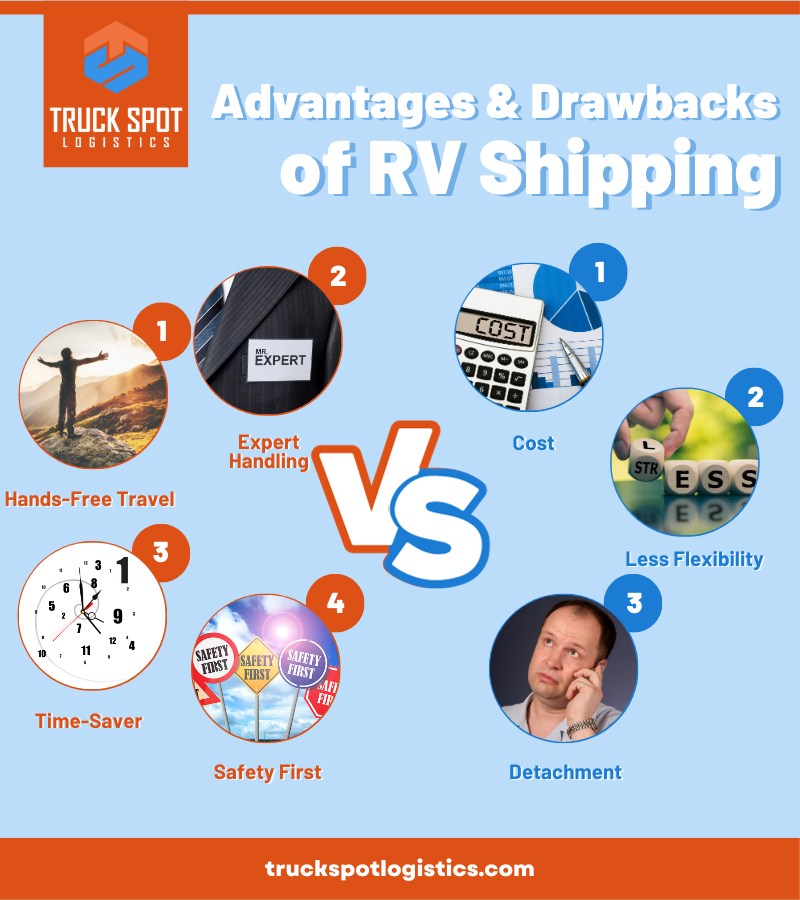
Benefits:
Drawbacks:
The Self-Starter Path: DIY RV Transport
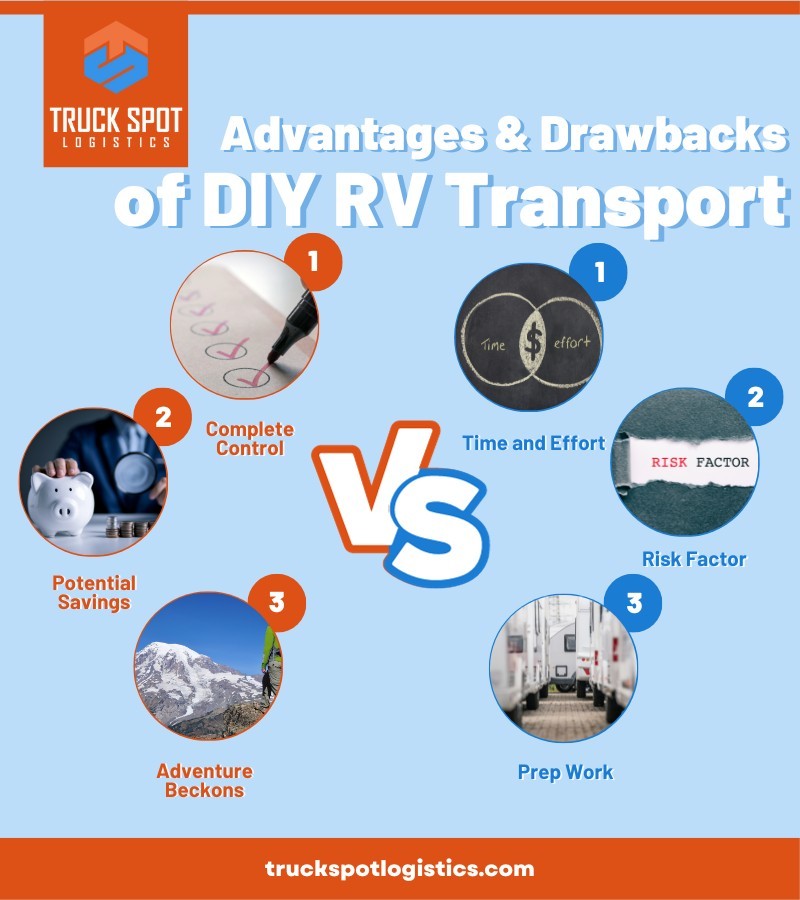
Benefits:
Drawbacks:
Before you decide, think about what’s most important for your trip. Is it the budget? The schedule? The level of comfort? Weigh these pros and cons against what you value most. And remember, whether it’s RV shipping or DIY RV transport, you’ve got options with TruckSpot Logistics at your fingertips.
Key Factors to Consider When Choosing RV Transport
Hitting the road? Whether you’re a snowbird heading south, a family planning the ultimate road trip, or relocating your rolling haven, choosing the right RV transport can make or break your experience. Here are some major factors to keep in your rearview mirror when making that choice.
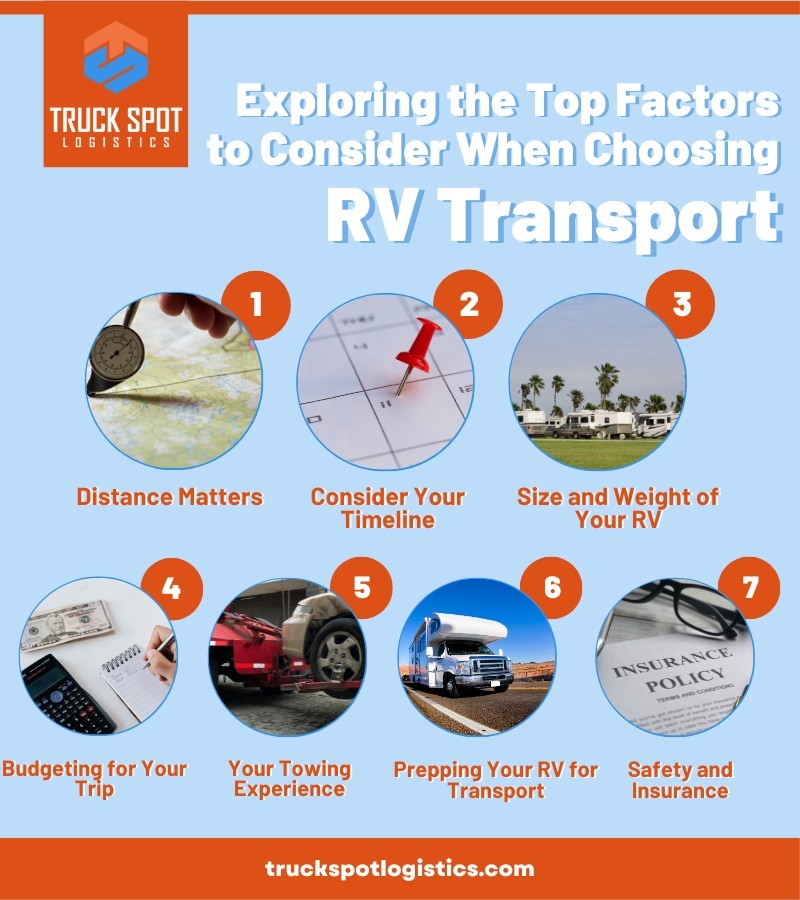
Each of these factors plays a pivotal role in your decision-making process. Take the time to assess each one, weighing the pros and cons with your individual needs and comfort level in mind. If you choose DIY, you embrace the adventure of the road with all its freedom and potential hiccups. Opting for professional RV shipping, on the other hand, might cost more, but it can grant you peace of mind and convenience, especially for those vast cross-country hauls.
For an even deeper dive into the intricacies of professional hauling, check out our insights on the essentials of transporting your recreational vehicle. Whether you decide to take the wheel or let the experts do the driving, the road to a successful RV journey begins with informed choices and thorough preparation.
The Step-by-Step Guide to Preparing Your RV for Transport
Preparing your RV for transport, whether you’re opting for professional RV shipping or taking on a DIY RV transport, requires a keen eye and careful planning. It’s not just about getting from A to B; it’s about ensuring your home away from home arrives in the same condition it left. Here’s a comprehensive guide to get your RV ready for the road:
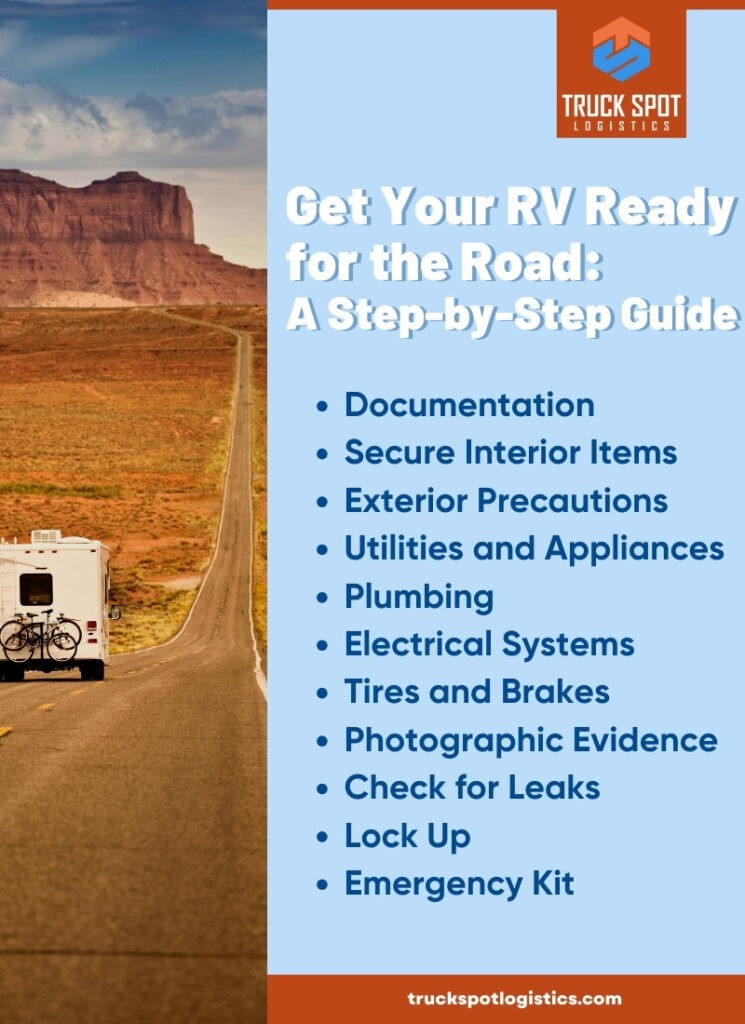
Remember, each RV is as unique as its owner, so tailor these steps to fit your specific situation. For more detailed information on each of these steps, including RV shipping quotes and tailored RV transport options, you can refer to authoritative sources or reach out to experts in the field for advice. By following this guide, you’ll help ensure your RV arrives ready for your next adventure, wherever that may be.
Real-World Examples: When to Ship and When to DIY
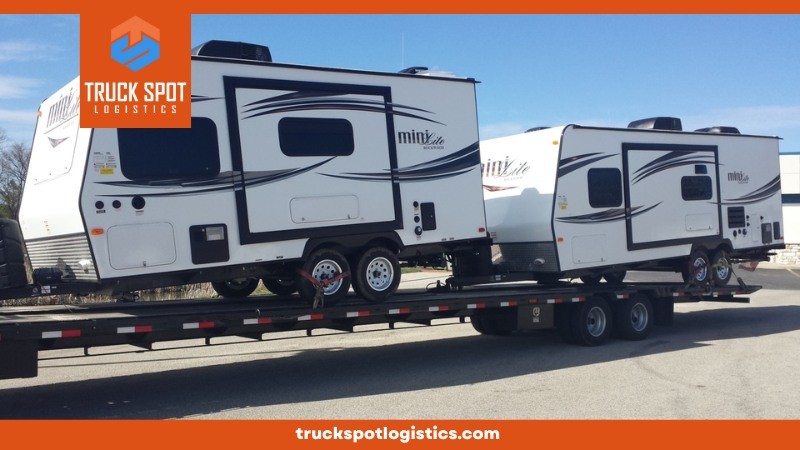
Navigating the crossroads of RV transport can often be illuminated by the headlights of those who’ve traveled before us. Below are four real-world scenarios that highlight when to consider RV shipping and when to tackle DIY RV transport:
Story 1: The Cross-Country Move
| Who? | The Johnson Family |
| From? | Tampa, Florida |
| To? | Portland, Oregon |
| Situation: | The Johnsons needed to relocate for a new job opportunity but had a limited time frame and a house full of belongings to move as well. |
| Decision: | They opted for professional RV shipping. Given their tight schedule and the massive distance, they couldn’t afford the time to drive the RV themselves. |
| Outcome: | The RV was transported efficiently, and the Johnsons were able to focus on moving their household without the added stress of driving across the country. |
Story 2: The Weekend Warrior
| Who? | Dave, a retired teacher |
| From? | His home in Dallas, Texas |
| To? | A nearby lake in Texas, about 150 miles away |
| Situation: | Dave enjoys weekend getaways throughout the year and loves the hands-on aspect of RVing. |
| Decision: | Dave always goes for DIY RV transport. For him, the drive is part of the adventure, and the distance is easily manageable. |
| Outcome: | He’s become an expert at packing and prepping his RV and enjoys the freedom of leaving on a whim without relying on shipping schedules. |
Story 3: The Overambitious Trek
| Who? | Ethan and Mia, a young entrepreneurial couple |
| From? | Denver, Colorado |
| To? | A tech conference in San Francisco, California |
| Situation: | They decided to combine a road trip with the opportunity to attend a pivotal conference, bringing their RV to avoid hotel costs. |
| Decision: | Despite having minimal experience in long-distance RV travel, they opted for DIY RV transport, underestimating the complexity of the journey. |
| Outcome: | Midway through Utah, they encountered mechanical issues with their RV, leading to missed conference days and costly repairs far from home. In hindsight, professional RV shipping would have saved them time and trouble. |
Story 4: The First-Time Buyer
| Who? | Sofia, a freelance graphic designer |
| From? | Los Angeles, California |
| To? | A festival in Nevada, roughly 300 miles away |
| Situation: | Sofia purchased her first RV for a festival but had no experience with towing or RV maintenance. |
| Decision: | Despite the short distance, Sofia opted for professional RV transport options for the peace of mind that it was done right. |
| Outcome: | The RV was delivered to the festival site, and Sofia could enjoy the event without the pre-trip anxiety or post-trip maintenance. |
In each of these cases, the decision to ship or drive rested on individual needs, expertise, and circumstances. While Dave relishes the DIY aspect of RVing, the Johnsons, Ethan and Mia, and Sofia found value in the convenience and reliability of professional RV transport. Whether it’s a matter of logistics, experience, or simply personal preference, understanding your own scenario can help in choosing the best RV transport options for your situation.
How TruckSpot Logistics Simplifies the Decision-Making Process
Making a decision between professional RV shipping and taking on DIY RV transport can be as complex as navigating a steep mountain pass. That’s where TruckSpot Logistics comes in, easing the journey with user-friendly tools and resources that guide you through the decision-making process:
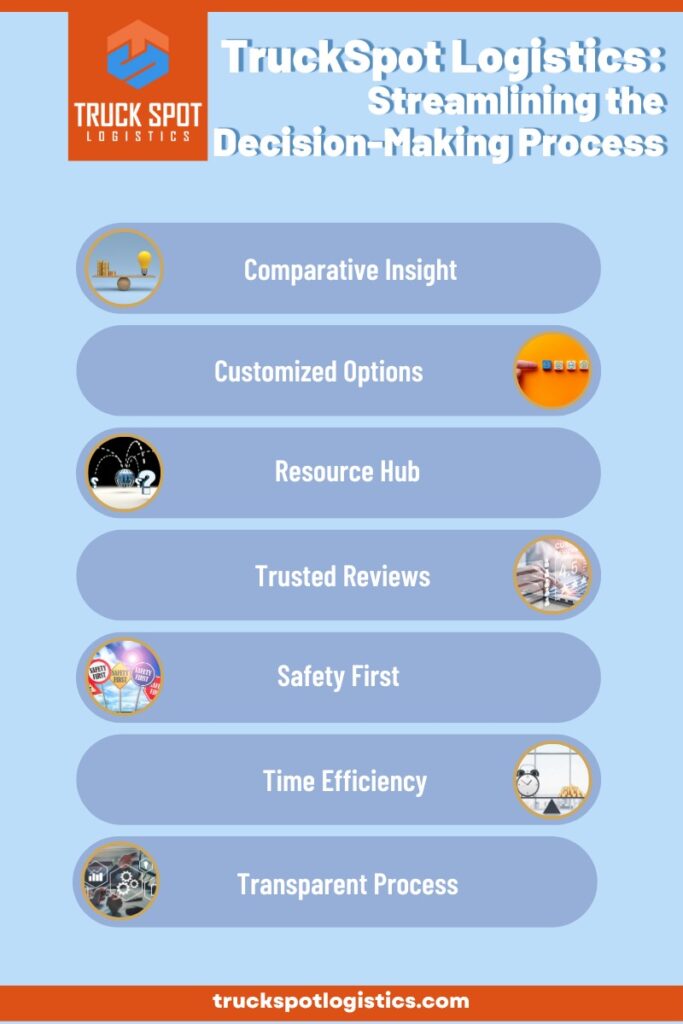
By using TruckSpot Logistics as your navigator in the realm of RV transport, you’re not just getting quotes; you’re gaining a partner that understands the importance of peace of mind, clear choices, and the joy that comes with a well-planned RV journey.
Whether you’re contemplating the thrill of a cross-country RV journey or simply seeking the most practical method to relocate your home on wheels, the decision between RV shipping and DIY RV transport boils down to a blend of personal preference, budget, and circumstance. Armed with the right information and resources like those provided by TruckSpot Logistics, you can navigate these waters with confidence, ensuring your treasured RV arrives safely at its destination, ready for whatever adventure lies ahead. Remember, the journey is just as important as the destination, and choosing the right transport option can make all the difference in your travel tale.
FAQs
How far in advance should I schedule RV shipping?
It’s best to schedule your RV shipping at least a few weeks in advance, although the earlier you can book, the better. This allows you to secure the best rates and ensure availability, especially during peak seasons.
Can I pack personal items in my RV when using a shipping service?
Most RV shipping companies have strict guidelines about personal items due to weight restrictions and insurance liability. Check with the individual shipper for their specific policy.
What kind of insurance do I need for RV shipping?
Reputable RV shipping companies should offer insurance coverage for the transport. Verify the extent of the coverage and consider purchasing additional insurance if necessary for peace of mind.
How are RVs typically shipped?
RVs are usually shipped via a flatbed truck or a specialized RV transporter. The method can depend on the size and type of your RV.
Are there any restrictions on DIY RV transport?
DIY RV transport is subject to state and federal regulations, including licensing, weight limits, and road safety standards. Always check the legal requirements before embarking on a DIY transport.
How much can I expect to save by choosing DIY RV transport over professional shipping?
Savings will vary depending on the distance, your RV’s fuel efficiency, and other travel expenses. However, don’t forget to account for the value of your time and potential wear and tear on your RV.












